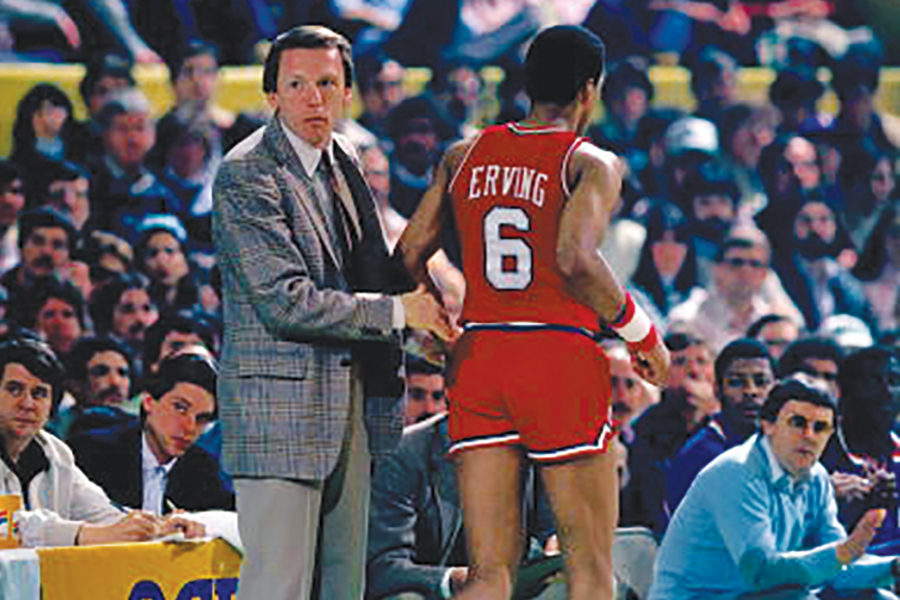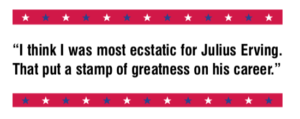
Cunningham with Julius Erving
Billy Cunningham looks back at the ‘82-’83 Champions
When the NBA restarts its season mid-July in the “Orlando bubble”, the Sixers have as strong a chance as any of the 22 teams in the field to win what would be their first championship in nearly four decades.
This past May 31 marked the 37th anniversary of the Philadelphia 76ers sweeping the Los Angeles Lakers in the NBA Finals. That team took a commanding 3-0 series lead winning game three 111-94 on the road. Billy Cunningham’s squad possessed four future Hall of Famers, and yet Cunningham, then in his fifth full season as head coach, had trepidation heading into game four.
“I had no confidence at all that [a win] was going to happen,” Cunningham said in a recent phone conversation. “We had been to the Finals a couple of other times and learned that any little thing that happened could throw the whole thing out of kilter.
“About an hour and a half after game three I was in my room watching film and Harold Katz [team owner] came by and said let’s go have a good time, it’s all over. I said Harold, you go have a good time. I have a lot of work to do. Fast forward to the next day when we have a shootaround. Al Domenico [team trainer] came over and said, ‘We got an issue. Moses [Malone] cannot exhale. He got hit in the back, and it’s affecting his lungs.’
“I went over to Moses and said, ‘How are you feeling?’ because we were going to take him to the hospital. He looked at me and said, ‘Don’t worry, coach, Kareem doesn’t want to see me anymore.’”
In game four, Kareem Abdul-Jabbar finished with 28 points and seven rebounds; numbers that paled in comparison to Malone’s 24 points and 23 rebounds, eight of which were on the offensive glass. Bad back and all, Malone played 45 minutes in the 115-108 victory.
“He was an amazing athlete,” Cunningham said of the Finals MVP. “He had an amazing mentality in that he believed that by the fourth, he would have worn you out, and now he was going to take advantage of you. He did it so often, especially offensive rebounding. There has never been a better offensive rebounder than Moses Malone in the history of the game.”

Malone continues to be the NBA’s all-time leading offensive rebounder with 6,731 o-boards, 2,133 more than his nearest competitor. Still, imagine Malone coming into the Sixers fold in the fall of 1982 via a trade for three teammates who helped the Sixers advance to the NBA Finals one season earlier?
“We were truly built as a defensive ball club with our quickness,” Cunningham said. “It went back to the day Moses signed with us. I was sitting with him in New York City, and he is about to sign this huge contract, and I was explaining what we would want him to do, and that was to dominate the defensive boards, get it out, and let us run as much as we could. If we get into the set offense, we will look to get the ball into you. He said, ‘Coach, that’s what I expect to do for this team.’
“Darryl Dawkins, Caldwell Jones, and Steve Mix left us that year,” Cunningham reminded. “Many players on the team were not happy about that because we lost in the Finals the previous year and had a real chance. But after three days of training camp, they understood what he [Malone] was going to bring to this team. He could do something those three could not: be a physical presence that we lacked in that time. He truly produced, as well as anyone could, in one season.”
If today’s Sixers’ roster could learn one thing from the ’83 Championship team, it would be to understand the climb to be the last team standing is arduous.
“We hear of the great quickness and athleticism today, but if you look at Bobby Jones, Julius Erving, Cheeks, Andrew Toney, and Moses, that is an awfully quick team,” Cunningham said. “I can’t imagine two better forwards or quicker forwards running a fast break than Bobby Jones and Julius Erving in today’s basketball. We relied on that, and the players embraced it; they got great joy and satisfaction out of playing that style. To do that is a great deal of sacrifice, and each of them was willing to sacrifice a little for the team.”
And for Cunningham, studying that film immediately after game three paid off. And the emotions that followed for him after clinching the championship were not unique.
“I hear this from every coach that’s won at any sport; first, it is a relief, and then you are ecstatic,” Cunningham said. “I think I was most ecstatic for Julius Erving. That put a stamp of greatness on his career. He had won a couple in the ABA and then wins a World Championship in the NBA after coming so close several times. In that game four, it truly showed his greatness. He struggled offensively in that game until the last three or four minutes. I still remember the jump shot he hit from the foul line extended and, boom, that put us over the hump. It was history from that point on.”
Maybe late this summer, there will be such a shot that stands out as pivotal for this Sixers team’s success; a shot that years from now will vividly be remembered along with the many society-changing events that impacted not just sports, but humanity as a whole in 2020.

